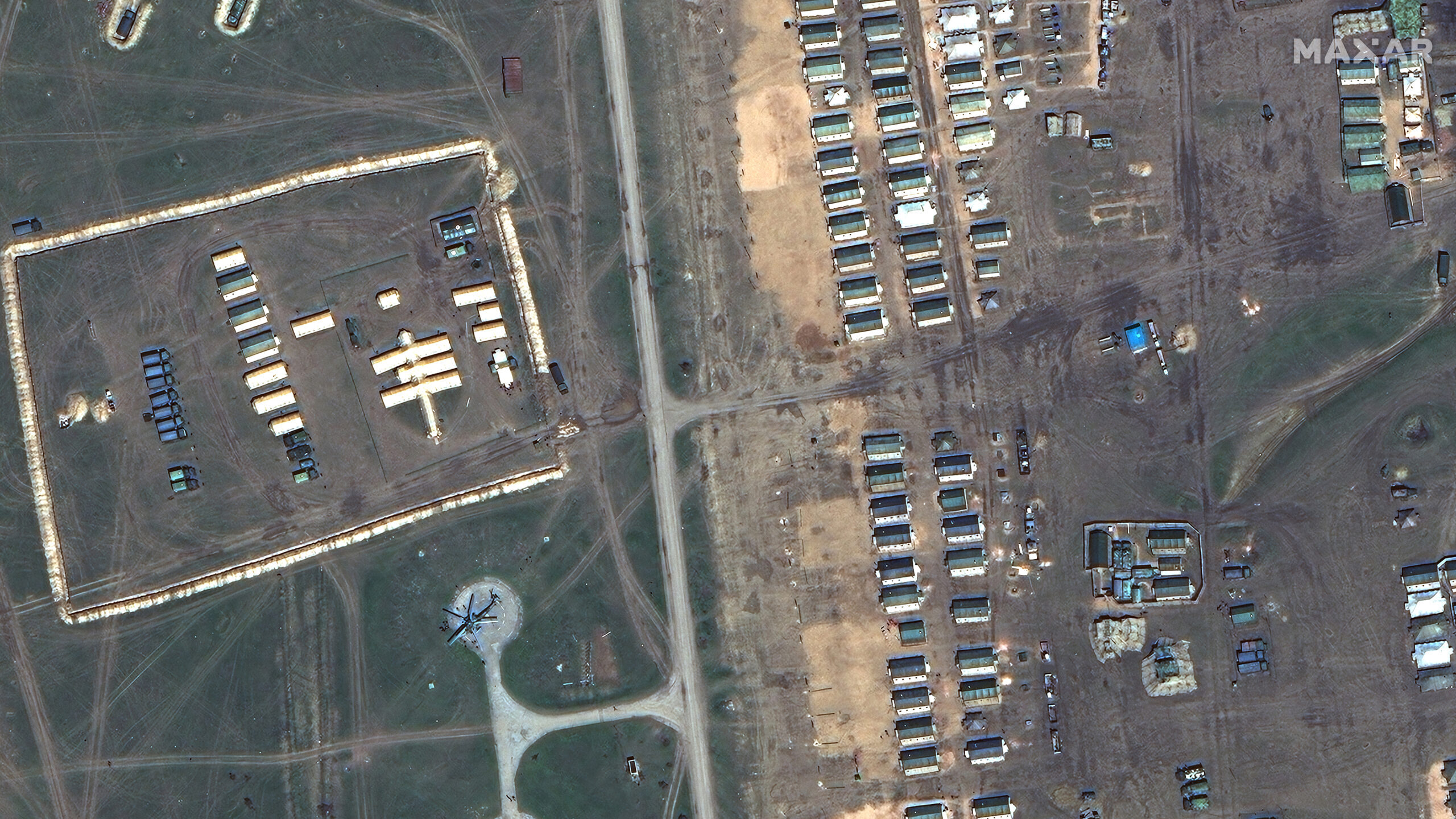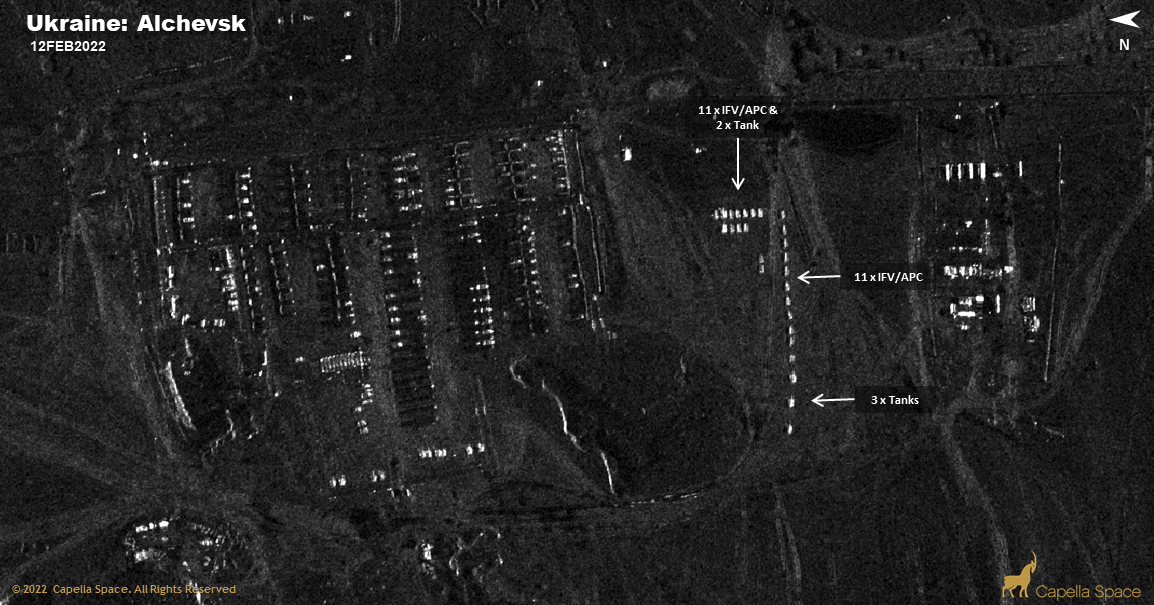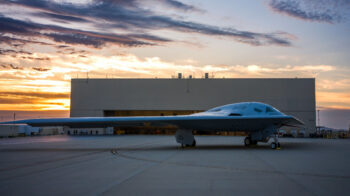
Russia will likely seek to block Ukraine from accessing space-based commercial ISR, like this Maxar photo from 2021. (Satellite image copyright 2021 Maxar Technologies/accessed via Getty)
WASHINGTON: There is little question that Russia will jam and/or spoof GPS receivers should it decide to invade Ukraine, as going after GPS has become almost ubiquitous as a first military move since the conflict in Kosovo.
But US government officials, former officials and outside experts are divided on how worried the US government ought to be about attacks aside from GPS jamming. Specifically, there is concern that Russia could directly target US intelligence, surveillance and reconnaissance (ISR) satellites, including commercial remote sensing birds.
A kinetic attack, such as the one Russia tested in November, seems unlikely, as it would risk drawing the US into a conflict the President Joe Biden has said he has no plans to join. But Russia has a whole host of non-kinetic options for targeting satellite systems that could still be disruptive or destructive for American industry and its government customer, and which raise the question about where the line is between an act of aggression and an act of war.
Attacks on ISR sats: will they or won’t they?
The Russian military has routinely jammed GPS in Eastern Ukraine since the Crimean conflict in 2014, according to experts inside and outside the US government, and often spoofs GPS simply to disguise President Vladimir Putin’s movements around Moscow.
“We’ve seen lots of evidence of non-destructive counterspace capabilities being used by Russia in both Eastern Ukraine and Syria since 2014 and there’s a lot of evidence that these capabilities are fully integrated into their units at the doctrinal and operational level,” said Brian Weeden of Secure World Foundation (SWF). “So, I definitely expect ubiquitous use of jamming, spoofing, and cyber attacks against services like the civil GPS signals and satellite communications if Russia opens a new front in Ukraine.”
That evidence — as well as a wealth of information about Russia’s effort to develop destructive anti-satellite technology — is publicly documented in SWF’s 2021 annual Global Counterspace Capabilities report, as well as the sister report by the Center for Strategic and International Studies (CSIS) called Space Threat Assessment 2021.
Russia’s calculus on other types of satellites, however, is an open question. In particular, the fact that Ukraine is reliant on outside sources, including the US, for imagery about Russian troop movements raises the possibility that Russian military commanders might see those satellites as targets.
“Even though [America is] not directly involved in the conflict in other domains, we will be in space, because we’re likely going to be providing real time tactical intelligence from our space based assets to the Ukrainian forces. And that makes our space assets a target for the Russians,” CSIS’s Todd Harrison said.
Such attacks will be more likely if Russian forces find themselves in trouble in Ukraine, he said, “because Ukrainians are acting on really good intelligence about where the Russians are.” Thus, “Russia might try to cut that off” using “laser dazzling” to blind satellite cameras “or even maybe even a kinetic ASAT weapon.”
RELATED: Russian ASAT debris imperils DoD, NRO sats, while ISS risks increase: COMSPOC
However, several other experts said the odds on Moscow directly targeting US government spy or missile warning satellites are low because Putin does not want the US or its allies to become involved in Ukraine. An attack on those ISR satellites, especially using a destructive ASAT such as the one Russia tested on Nov. 15, would almost certainly guarantee a US response.
“I doubt that the Russians would do anything in space. The US and their allies have made it clear they have no desire or intention to become embroiled in the actual conflict although they are certainly ready with sanctions and to respond if needed,” Doug Loverro, former head of Pentagon space policy, said in an email.

Satellite imagery from Capella Space appears to show armor build-up in Ukraine on Feb. 12, 2022.
“It’s easier to stay out of conflict when you have no direct attack on US or NATO assets. And the Russians do not want the US involved, so they will likely avoid any direct physical attack on US assets.”
Weeden agreed, saying “It’s extremely unlikely that Russia would escalate that to destructive attacks against US or NATO satellites. We have never seen those kinds of counterspace attacks used in warfare to date and it would almost certainly draw the US and NATO into the conflict, something Russia desperately doesn’t want to happen.”
On the other hand, Loverro said that jamming and cyber attacks are not just possible but likely — noting that the Law of Armed Conflict (LOAC) clearly sets out that any satellites being used by Ukraine, no matter who owns those satellites, are fair game.
“The likelihood of jamming is quite high (as are cyber-attacks) because under anyone’s interpretation of the LOAC, any communication/information systems being used by the Ukrainians are legitimate targets, even if the other end belong to the US or NATO,” Loverro said.
The commercial conundrum
It is important to recognize that under LOAC, Russia also could legally attack satellites operated by US (and allied) commercial companies. Some US commercial firms already are keeping eyes on, and making public, Russian military forces poised to surge into Ukrainian territory. This includes several under contract with the National Reconnaissance Office (NRO).
Indeed, for a a number of reasons, Russia might feel more free to interfere with commercial remote sensing satellites than those operated by NRO and the Defense Department. For example, cyber protections used by commercial satellites may not be as robust as those used by the military or the Intelligence Community, making it both easier for Russian hackers to get in and harder to pin any shenanigans on them if they do.
And that, several sources said, would be a win for Moscow.
“I think they would probably even benefit from having that the most — a kind of gray area attack against the commercial stuff,” one US government official said. “I would think that making it as difficult as possible to attribute with respect to the commercial actors just throws so many wrenches in the works that it would be to their advantage.”
A former government official with experience in the cut and thrust of cyber jousting agreed that commercial satellites, especially those being “used as proxies” for the US government, are most certainly at risk.
And that, the former official and several other sources said, raises a host of complex policy and legal questions for the US government and DoD about response options — questions that, while the subject of decades of discussion and wargames such as that held annually at Schriever Space Force Base in Colorado, still have not been fully answered.
Certainly up to now, jamming and spoofing of GPS signals essentially has been tolerated by the Pentagon, the US government official said. That seems to indicate that similar actions against ISR satellites might also be accepted, especially if those satellites are commercial ones.
“I don’t think we would respond,” the government source said bluntly, stressing that that fact makes it all the more likely that non-destructive attacks will become “low hanging fruit” for adversaries across a range of space systems, including commercial ones.
The question of “where is the line?” on interference with space systems, especially commercial ones, hasn’t been answered, at least not in the public domain, the former government official said.
That in turn begets questions about not only what protection the US government owes commercial providers, but also whether the market might punish those operators who take on military jobs — as the Pentagon and the IC have increasingly been interested in making happen to save money and inject new technology. For example, might investors and or insurers be spooked in future if commercial satellites are victims in the Ukraine conflict?
Harrison agreed, noting CSIS has advocated for the US government to indemnify commercial operators they contract with for losses caused by adversaries for just that reason.
“We need an indemnification program, where we go ahead and tell satellite operators in advance: ‘If you agree to work with the US government, even in a crisis, then we will indemnify your losses’,” he said.
Sullivan says Ukraine supplemental should cover all of 2024, long-range ATACMS now in Ukraine
“We now have a significant number of ATACMS coming off their production line and entering US stocks,” Jake Sullivan said today. “And as a result, we can move forward with providing the ATACMS while also sustaining the readiness of the US armed forces.”


























